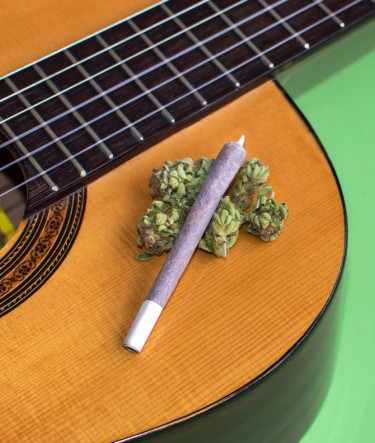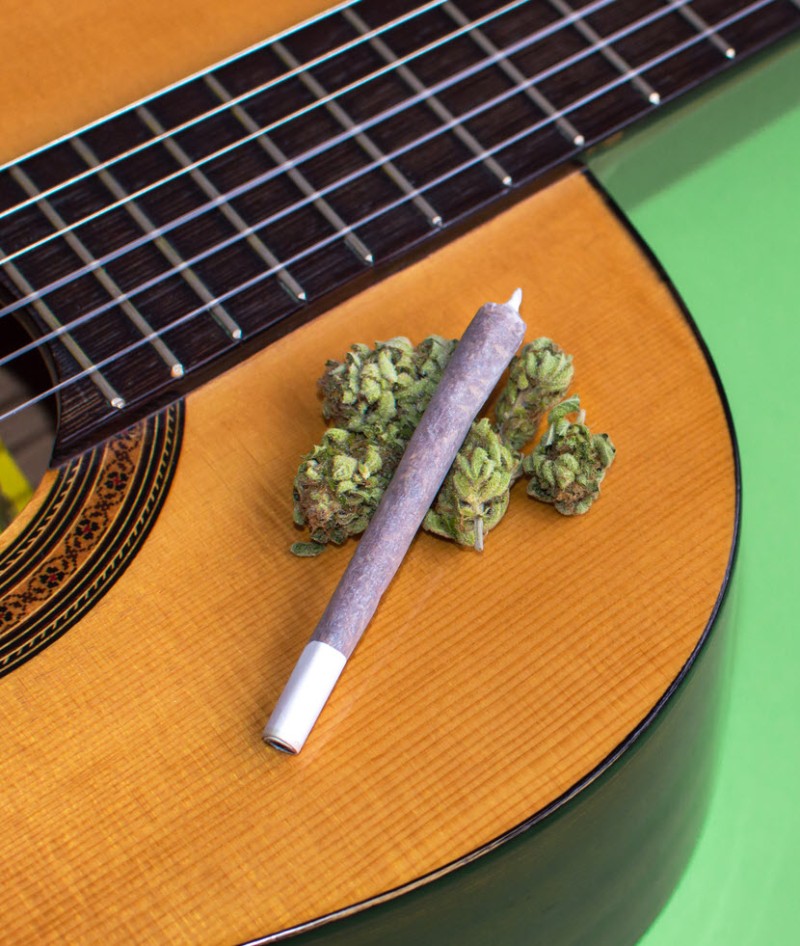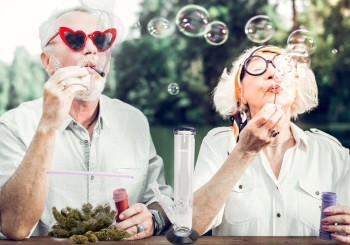
Psychoactive Listening – A Study on Weed and Music
I'll never forget the first time I truly "heard" Pink Floyd's "Time." Sure, I'd listened to it dozens of times before, but this was different. I had just taken a few hits from a joint when those haunting clock chimes began. As the song progressed, I found myself noticing things I'd somehow missed in all my previous listens – the intricate layers of percussion, the subtle interplay between the guitars, the way the bass line weaved through it all like a musical serpent. It wasn't just hearing the music; it was experiencing it on a completely different level.
Ask any cannabis enthusiast about their relationship with music while high, and you'll likely get a knowing smile followed by something along the lines of, "Everything just sounds better." It's not just about enhanced audio perception – there's a profound sense of immersion that transforms familiar songs into entirely new experiences. The music doesn't just play; it envelops you, pulls you in, and takes you on a journey through every note and rhythm.
For decades, this phenomenon has been widely acknowledged in cannabis culture, passed down through shared experiences and countless smoke sessions. However, the scientific community has largely overlooked this fascinating relationship between cannabis and musical perception. The lack of formal research has left us with plenty of anecdotal evidence but few concrete answers about what's actually happening in our brains when we combine cannabis and music.
That's finally changing. A groundbreaking new study is examining how cannabis affects our enjoyment and perception of music in real-world settings. Rather than relying on sterile laboratory conditions, researchers are meeting cannabis users where they naturally consume – in social settings where music is an integral part of the experience.
So pack a bowl, queue up your favorite stoner playlist, and join me as we explore the science behind what I like to call "psychoactive listening." It's time to understand why that bassline hits different when you're high, and what that might mean for our understanding of consciousness, perception, and the therapeutic potential of cannabis.
Cannabis and Music: Understanding the Science of Psychoactive Listening
Psychoactive listening isn't just about hearing music while high – it's about how cannabis fundamentally alters our relationship with sound. When researchers at Toronto Metropolitan University's SMART Lab began exploring this phenomenon, they were investigating something cannabis users have known intuitively for generations: marijuana doesn't just make music sound better; it transforms how we process and experience it entirely.
The study, currently underway at Club Lit, a cannabis consumption lounge in Toronto, takes a refreshingly practical approach to research. Instead of isolating participants in sterile laboratory conditions, researchers Chi Yhun Lo and Lena Darakjian chose to meet cannabis users in their natural habitat. As Lo explains, "Background music is always going to be a common part of most social experiences... What we're really interested in is pairing cannabis with these specific music experiences."
This real-world approach might seem unconventional, but it's precisely what makes the study so valuable. "Having a sterile environment is the ultimate confound," Lo argues, "because there's really such little stimulation happening, and it's so far removed from the real world." By studying cannabis users in their natural environment, researchers can observe authentic interactions between marijuana, music, and social dynamics.
The methodology is elegantly simple: patrons at Club Lit can scan QR codes at their tables, accessing surveys about their musical experience while under the influence. The playlists rotate through various genres – from jazz to electronic, rock to reggae – allowing researchers to track how cannabis might influence musical preferences and openness to new styles.
But this isn't just about understanding why your favorite album hits differently when you're high. The implications of this research stretch far beyond recreational cannabis use. The team is particularly interested in how their findings might shed light on conditions like musical anhedonia – a condition where individuals cannot derive pleasure from music.
The research could also provide insights into broader aspects of consciousness, sensory processing, and neurodivergent listening patterns. As Lo notes, "There could be a really fascinating intersection that no one has even considered yet. We are really just at the start of the journey, and we hope that there will be some really significant therapeutic opportunities that we can leverage."
Previous findings from the SMART Lab have already revealed intriguing patterns. Cannabis users reported changes in cognitive processing, including altered attentiveness, absorption, interpretation of lyrics, memory, and critical analysis. Perhaps most interestingly, many participants described an increased openness to new musical experiences while under the influence.
Looking ahead, this field of research could revolutionize our understanding of how psychoactive substances affect sensory processing and emotional responses to art. It might also lead to new therapeutic applications, potentially helping individuals with various forms of anhedonia or sensory processing disorders.
For now, the researchers continue gathering data, aiming to involve 1,000 participants in their study. As we await their findings, one thing is clear: what many of us have experienced anecdotally – that special relationship between cannabis and music – is finally getting the scientific attention it deserves.
Stoned Musings: A Cannabis User's Theory on Enhanced Musical Perception
As someone who's spent countless hours both making and listening to music while under the influence of cannabis, I've developed my own theories about why marijuana seems to enhance our musical experience. Sure, it's not peer-reviewed science, but after decades of firsthand research (if you catch my drift), I think I've stumbled upon some interesting insights worth sharing.
At its most basic level, I believe cannabis fundamentally alters our baseline consciousness. Now, before you roll your eyes at what sounds like typical stoner philosophy, hear me out. When we're sober, our brain processes reality through a particular filter – one that's been fine-tuned through years of evolution to help us survive. This filter prioritizes certain information while downplaying others, helping us navigate our daily lives efficiently.
But throw some THC into the mix, and something fascinating happens. That default filter shifts ever so slightly, creating what I like to call a "perspective drift." The external world hasn't changed – the same soundwaves are still hitting your eardrums – but the way your brain processes and interprets this information has been altered.
Think of it like this: Imagine you've lived in the same house for years. You know every corner, every creak in the floorboards. Then one day, you look at your living room from a different angle, maybe lying upside down on your couch, and suddenly you notice details you've never seen before. The room hasn't changed, but your perspective has, revealing aspects that were always there but previously filtered out by your brain's autopilot mode.
I believe something similar happens with music when you're high. Cannabis temporarily disrupts your brain's usual filtering system, allowing you to experience familiar songs as if hearing them for the first time from this slightly shifted perspective. Suddenly, that bassline that was always there but never caught your attention becomes impossible to ignore. The subtle harmonies in the background vocals jump to the forefront. The intricate patterns in the drum fills reveal themselves like hidden treasures.
Of course, this is all just educated stonerthink based on personal experience. There could be (and likely are) complex neurochemical processes at play that explain why cannabis affects our audio processing in such unique ways. Maybe THC temporarily enhances our ability to process multiple audio streams simultaneously. Perhaps it affects our sense of time, allowing us to perceive micro-changes in rhythm and tone that we typically miss. Without more scientific research, we can only speculate.
But that's part of what makes this field so exciting. We're finally starting to bridge the gap between anecdotal experience and scientific understanding. The research being done at Club Lit might validate some of these "stoner theories" or reveal entirely new mechanisms we haven't even considered.
Until then, I'll keep exploring these sonic landscapes through my slightly altered consciousness, confident that while I might not fully understand the "why" behind cannabis-enhanced music appreciation, the experience itself is undeniably real.
The Sticky Bottom Line
Well folks, there you have it – that age-old stoner wisdom about music sounding better when you're high isn't just cannabis folklore anymore. Science is finally catching up to what we've known all along, and while researchers are still untangling the neural mechanics behind it all, one thing's crystal clear: cannabis fundamentally changes how we experience music.
So the next time someone gives you grief about smoking up and listening to Pink Floyd's "Dark Side of the Moon" for the thousandth time, you can proudly inform them that you're not being lazy – you're engaging in "psychoactive listening." You're not just getting high; you're conducting a personal exploration into altered states of musical perception. Sounds much more sophisticated, doesn't it?
Maybe there's something deeper happening during these sessions. Perhaps when we're high, we're able to pierce through the veil of our usual perceptions and connect more intimately with the artist's intent. Those subtle emotional undertones in the vocals, the passionate nuances in the guitar solos, the intricate interplay between instruments – maybe we're not just hearing them more clearly, but feeling them more deeply too.
Or maybe we're all just really high and everything sounds amazing. Either way, science is finally starting to validate what cannabis users have been saying all along. So pack that bowl, put on your favorite album, and get ready for some serious psychoactive listening. After all, it's not just recreation anymore – it's research.
INSPIRATION:
https://www.marijuanamoment.net/scientists-explore-how-marijuana-affects
-enjoyment-of-music-through-new-study-at-cannabis-lounge/







